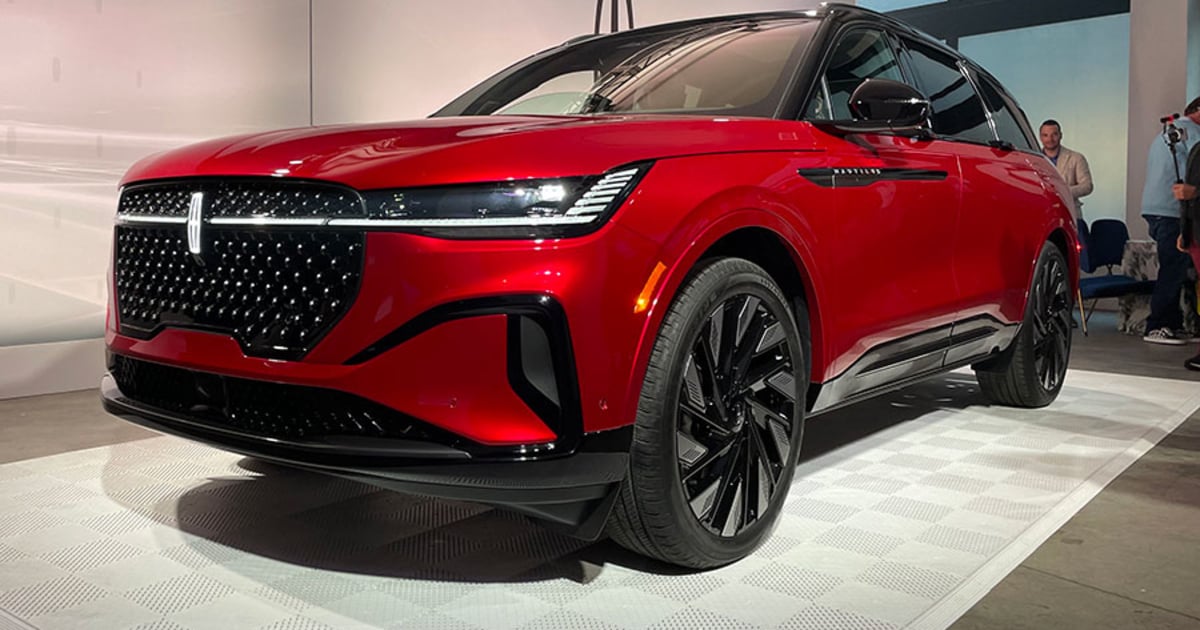
NEW YORK — Lincoln, a brand that for more than a century has helped define American luxury, will for the first time import a vehicle to its home market from outside North America.
The redesigned 2024 Nautilus crossover, on sale early next year, will be the first Lincoln sold in the U.S. that’s manufactured in China. The vehicle had been built in Ontario for the North American market, but Ford Motor Co. is retooling the Oakville Assembly plant in Ontario to produce electric vehicles.
“From a manufacturing efficiency standpoint, given what’s happening in Oakville, we chose to build it in China,” Lincoln President Dianne Craig told Automotive News. “We’ve had an unwavering support of auto manufacturing in the United States; in this case, it just made business sense for us. I think the product’s going to be phenomenal and customers will love it.”
Although its U.S. sales fell 16 percent last year, the Nautilus remains a key product for Lincoln as the brand has consolidated its portfolio in recent years to focus on utilities instead of sedans. Lincoln executives say the midsize utility segment in which it competes represents 43 percent of premium vehicle sales.
In the first quarter of 2023, Nautilus sales rose 8.2 percent in the U.S.
Executives hope the redesigned vehicle can attract new, younger buyers with its exterior styling, interior amenities and new technology.
“It’s the game changer for the brand,” Michael Sprague, Lincoln’s North America director, told Automotive News. “This puts us on the map for the customers who haven’t considered us in the past. The segment’s about 40 percent of the luxury market, and we’re a 2 percent player right now. It’s a huge opportunity.”
The 2024 Nautilus will start at $51,810, including a $1,395 shipping charge. That’s up from $46,865 for the current base model.
The top-end Black Label trim will start at $75,860. Order banks opened Monday.
When company officials attempted to revive Lincoln in the last decade, they focused on creating a sanctuary theme for the interior of its vehicles. The 2024 Nautilus is the next evolution of that concept, executives say.
The biggest addition is the display spanning the full width of the dashboard that’s made up of two 24-inch screens.
Elsewhere in the interior, designers have added “crystal-inspired” details to the piano key shifter, instrument panel toggles and audio knob. It’s a nod to features showcased on Lincoln’s Model L100 concept vehicle last year.
The Nautilus will be the first U.S. product to offer an optional “Lincoln Rejuvenate” feature, which combines ambient lighting, displays on the 48-inch screen, 28 speakers, massaging seats and personalized scents.
Three scent cartridges are located in the center armrest and can be refilled by the customer when they run low. Fragrances include Mystic Forest, Ozonic Azure and Violet Cashmere.
The vehicle can receive over-the-air software updates and will come with Lincoln BlueCruise 1.2, the brand’s latest hands-free driver-assist system that includes automatic lane-change assist. The Lincoln version previously was called ActiveGlide, but officials have rebranded it BlueCruise to match the name used on Ford models.
The exterior includes a new design element: a horizontal light bar running through the mesh grille and Lincoln star logo that connects to the headlights, similar to the design of the Model L100 and Star concept vehicles.
The Nautilus will come standard with a carryover 2.0-liter four-cylinder engine, also found on the recently freshened Corsair, that gets 250 hp and 275 pound-feet of torque and is mated to an eight-speed transmission.
A new hybrid option is available on all trims, featuring a 2.0-liter turbocharged hybrid engine and a continuously variable automatic transmission with a 100 kW electric motor. The hybrid system is expected to generate 310 hp.
The hybrid powertrain means three of Lincoln’s four U.S. nameplates now have an electrified option. The brand has vowed to launch three full EVs globally by 2025 and add a fourth in 2026.
Executives have said they expect almost 90 percent of Lincoln’s volume in North America to be electric by 2030.
Earlier this year, officials said nearly 60 percent of Lincoln’s dealer network had signed up to sell future EVs as part of a new certification program that requires them to invest up to $900,000, mostly on charging infrastructure.

